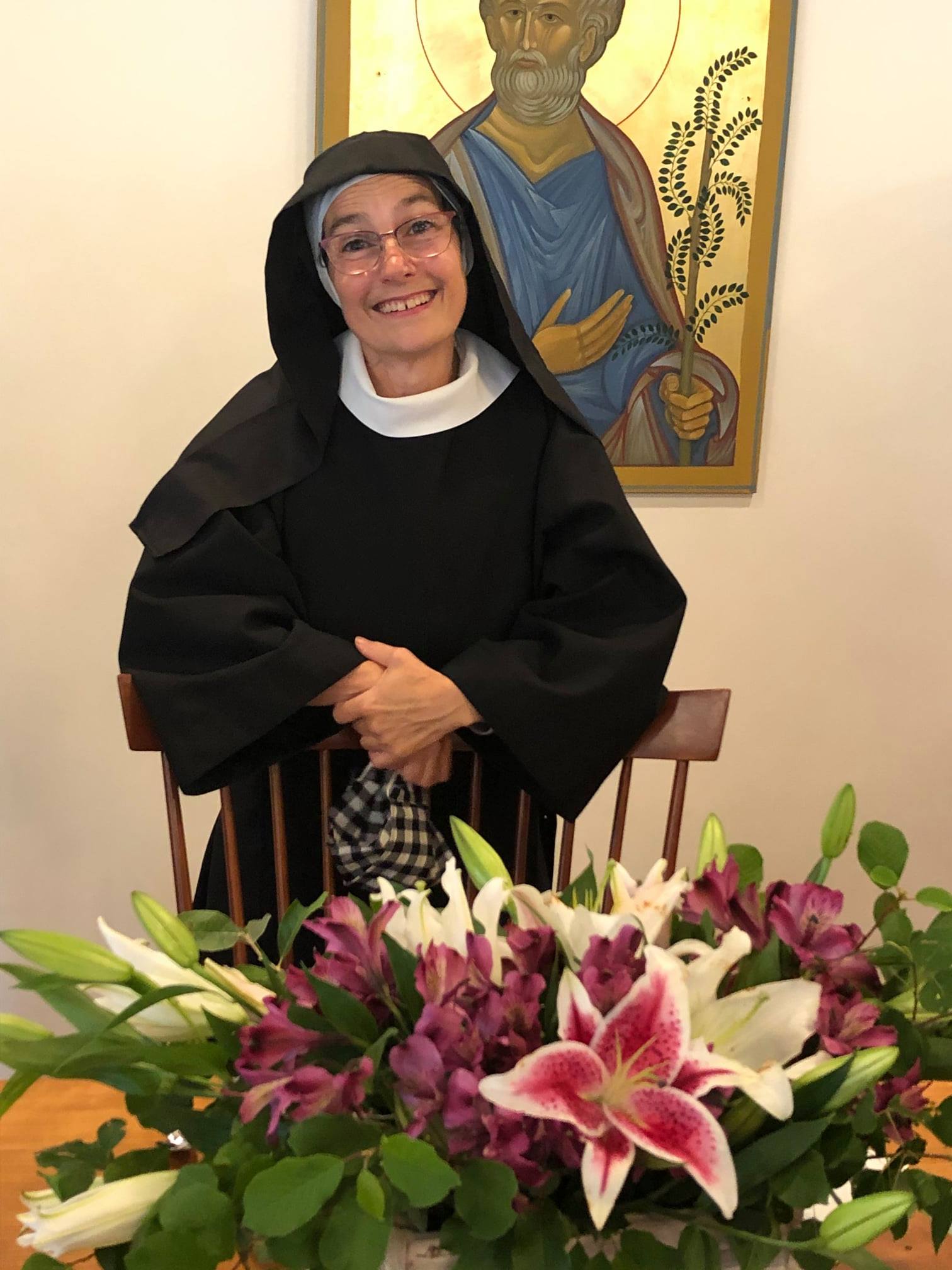
“But how can this be?” (Luke 1:34) Mary’s response of amazement, befuddlement, incredulity, to the angel Gabriel resonated in my heart and echoed in my ears as the new direction that my life was taking became clear. (Though my terms had a decidedly 21st Century flavor: “No way, couldn’t be me! I’m too old… I’m too implacable… You gotta be kiddin’!… You are kidding, right?… Not kidding? Wow. Well, OK then!”) So began the journey that led to my betrothal to Christ this past August.
Standing before the altar, with arms raised and tears of joy rolling down my cheeks, I sang the Suscipe – begging the Lord, “Receive me.” I professed, before God, my brothers and sisters, and a small gathering of friends, my simple vows as a Benedictine nun.
On the eve of these first vows, the black veil which I now wear was blessed. The ceremony includes these words: “…sanctify this veil, which your servant desires to wear as a sign of her monastic profession. By this all may know that she has been set apart from other women to be dedicated to your service.”
How can this be?! How could this be my veil; how could it be that (thanks be to God!) I am taking this step? Because God put the desire in my heart; because He set me apart, nurtured my love, enkindled my hope; because God is infinitely merciful and infinitely patient.
Like the parable of the barren fig tree in Luke’s gospel (Lk 16:6-9), the vinedresser begs the vineyard owner to leave the fruitless tree standing one more year. “I will hoe around it and fertilize it. It may yet bear fruit.” Responding to God takes being open-hearted, and open-eared, (and sometimes, being open to being considered a bit crazy, by worldly standards) in order to pursue that thing you ‘just have to do’ – that thing that brings your heart joy. Whether that vocation is parent, nurse, artist, or contemplative monastic, Jesus knows when you are ready in disposition to attend to His call. It’s all done in God’s good time – and not a moment sooner! He tends and prunes; only then are we able to “listen with the ear of our heart,” to find our true vocation; only then do we bear fruit.
In the “Mirror of Eternal Blessedness”, the 14th century mystic, John Ruusbroec, writes: “The Holy Spirit reveals His grace in a person’s heart. If a person wishes to accept… He opens his heart and will to God….” Our response is from our free will; but the seed was created by the Father, planted by the Holy Spirit, and tended by the Son. Ruusbroec continues: “There is in addition a love which is between you and God. This love is a holy desire which rises up to God’s glory, accompanied by thanksgiving, praise, and all the exercises of love.”
My desiring to wear the veil, proclaiming aloud my vows of obedience, stability, and conversatsio morum, and the signing of my vow chart on the altar are indicative of my promise to be solely dedicated to God’s service and my yearning to cooperate with God’s will. “Prefer nothing to Christ” is the kernel at the center of the Rule of Benedict and is the objective of each of the Benedictine vows. And now, it is the animating guide for my life. It is with great joy in my heart that I will put into practice those exercises of love: praising God, seeking God, and giving thanks through living the vows I have made.
Actually, it seems God prefers to unfold His plans in unexpected ways. Like bringing a hopeless tree back to life, like smiling down as a 55 year old professes simple vows as a Benedictine, …or like bringing salvation to the world through His incarnation as a babe born of a virgin.
“But how can this be?” Only by God’s grace and love, which make all things possible. Amazing, isn’t it?! Please pray for me; I am praying for you.
